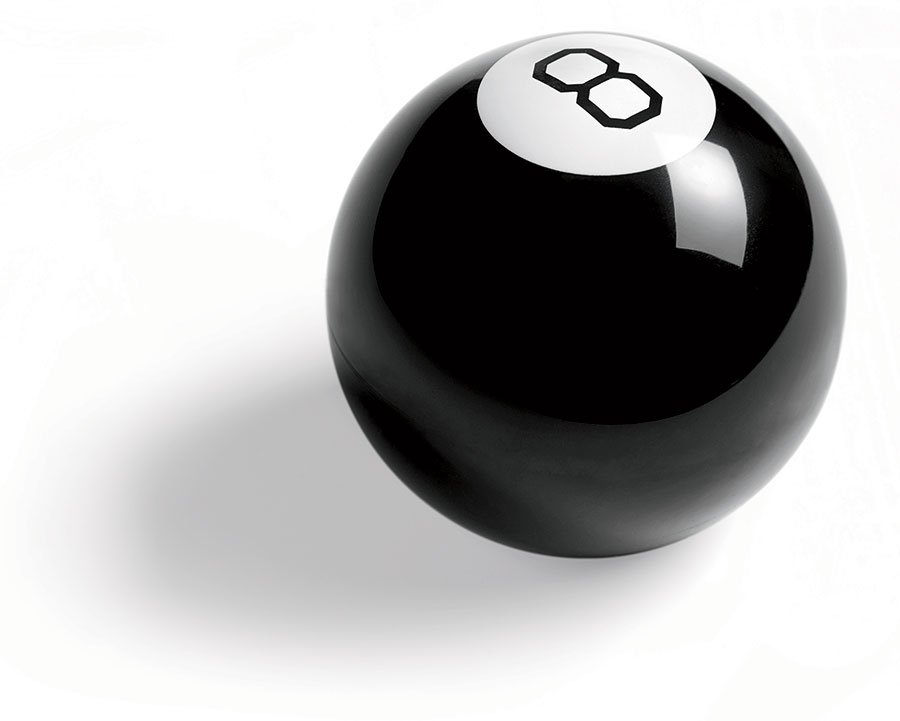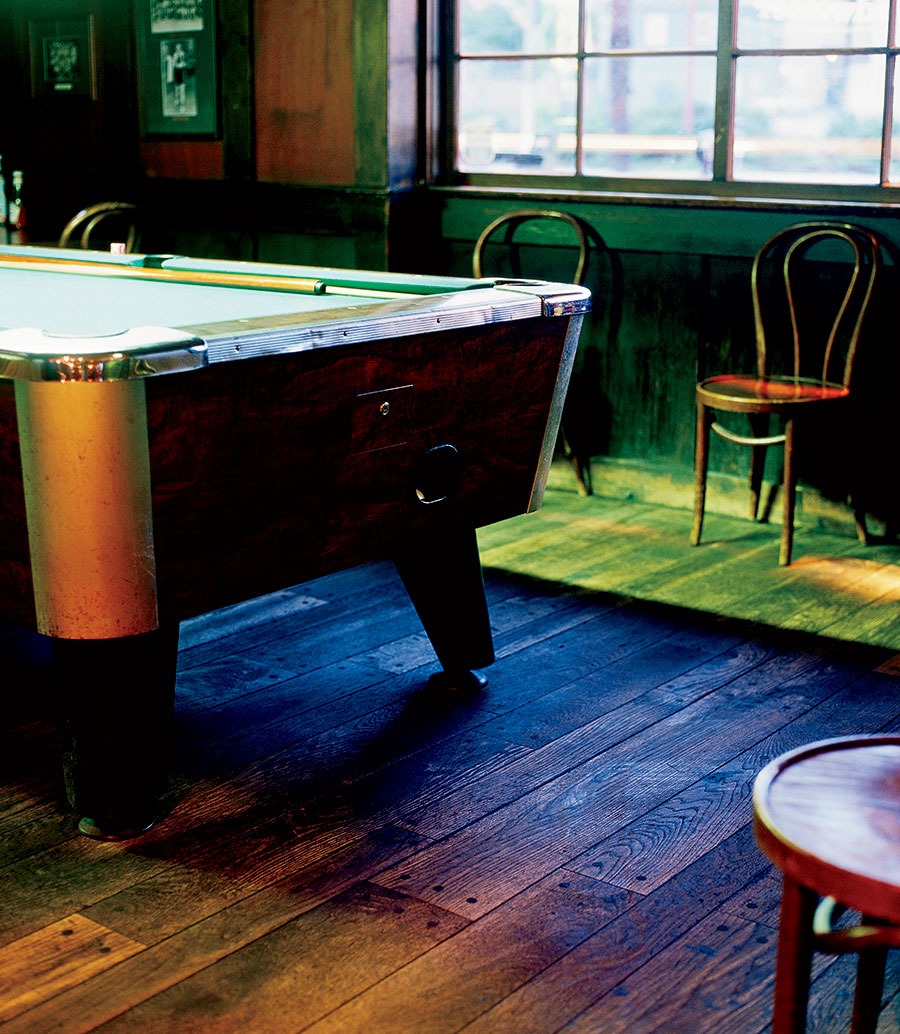My parents were teenagers when I was born. Their courthouse marriage ended before I was 2. Dad got custody of me, and we lived in Humboldt Park until he died when he was 23. I was 7. I went to live with my mom in Berwyn.
Some days instead of taking me to grade school, my mom, like all normal moms, took me to bars for no other reason than it was a Tuesday. One day in 1985, when I was 11, I ordered our usual (two Manhattans) and sat down near a green table with balls on it lit from above by three cones of white light. One of the regulars asked me if I played. I hadn’t — I had never even seen a pool table before. He explained how to use the white ball, called a cue ball, to pocket the other balls, by stripes or solids, with the eight ball going in last.
Then he showed me how to really play — how to line up a shot, how to make the first shot but think about the second, something called “getting shapes” or “leaves.” He taught me how to look at the whole table after the break, to look for a “run” and, if I didn’t have one, leave the other guy nothing. I won a buck off him after he scratched on the eight ball. When the dollar hit my hand, it was how I imagine Michael Jordan felt six years later when he won his first championship with the Bulls.
It stuck. For most of my teen years, I spent 12 hours a day at a pool hall. Mostly Oak Park Billiards off Harlem, with routine pilgrimages to Marie’s Golden Cue or Chris’s on Milwaukee. By the time I was 16, the houseman, seeing me walk in, would set out the ball tray, a pack of cigarettes, and a white Styrofoam cup of two-day-old coffee. I was somebody. I had arrived.
I was good and a few times touched on great but was never great long enough to beat the hustlers and players who lived in great. Among them were handsome men, ugly men, skinny men, men with nicknames like Jamaican Erin, Good-Looking Chris, and Psycho Chris, who, living up to his name, once asked me if I had access to phosphorus grenades because he “had a car lot to take care of.”
In the mid-’90s, I worked at a beef and dog stand in Rogers Park across from Loyola that had 10 pool tables and a little arcade room. It was not a known stop for hustlers or big money players, but we still had a few wander through to check it out, to turn a couple of squares upside down and shake their pockets loose for chump change or work on their game outside of the prying eyes of the players at their home halls.
One money player who came around went by the name Banks. He was in his 40s, rail thin, with a black pick proudly poking out the right rear side of his perfectly coifed Afro. He was always dressed in his mechanic’s uniform, which included dark Dickies pants and a light blue work shirt with a small oval name patch over his left breast pocket that read “Banks.”
I never knew his real name. He was nicknamed Banks because that was his favorite pool game. Banks is a simple game with simple rules: The first person to bank in eight balls wins, meaning each shot must be a bank that you call, so no slop (lucky shots).
By the time I was playing Banks, I was 20, just kicked out of college and trying to piece together some semblance of a life.
When he and I played for short money, say a race to five (first to win five games of banks) for 20 bucks, he’d barely beat me. But when we’d play for real money, anything over a hundred, I couldn’t touch him.
“Why you hustling me?” I asked one day.
“I ain’t hustling nobody,” he replied. “I beat you fair and square.”
“You were dogging when we played for 20, but now that we’re at a hundred, you ran me straight out.”
“You think I’m gonna show you my A-game for 20 dollars?” Banks said.

It melted my brain. My whole life I thought you gave 100 percent all the time. It never even occurred to me that it was my choice who got to see my A-game — on the pool table or in any other area of my life. Banks had just opened the door to a whole other way of being. We played more and I lost more — $200 — but while losing, I was seeing him and my loss in a whole new light.
After I paid him, we walked down the block to an auto body shop that was closed for the night. “This where you work?” I asked.
“Nah,” he answered, not following up with any more information.
He strutted over to a new red Cadillac Eldorado with gold rims on Vogue tires. “This is a pretty fucking dope car for a mechanic,” I said. Banks laughed. “I ain’t a mechanic,” he replied. “I’m
a multimillionaire.”
“Then why dress like a mechanic?” I asked.
“When’s the last time a motherfucker robbed a filthy mechanic?”
“You were dogging when we played for 20, but now that we’re at a hundred, you ran me straight out,” I said to Banks. His response? “You think I’m gonna show you my A-game for 20 dollars?”
I laughed.
“How you doin’ on your stories?” he asked. “You still writing ’em?”
A month earlier I’d snuck into Loyola’s student center and printed out a story I wrote and gave it to Banks. I was honored he remembered. “I’m trying to figure out the next one,” I said.
“Trying don’t mean shit. The world doesn’t owe you a fucking thing. You gotta get out there and take it. That story was good. Polish dudes living in a tent, shitting in coffee cans with nothing so they could build a house in Glenview. Nobody is telling them stories. You’re poetry for savages.”
He got in the Eldorado, then held out my $200. When I went to grab it, he snatched his hand back and made like he was combing his hair with it.
“What are you gonna do?” he asked.
“Maybe get a sixer from Bruno’s and head home. Wanna grab a drink?”
“Nah, dummy. What are you gonna do with your life?”
“Shit, I don’t know.”
“Well, you better figure it out, or somebody else will do it for you. Worst thing that can happen is you live your whole life making some other motherfucker’s dream come true, working this shit job or that, and I can tell you right now you ain’t gonna make a living hustling pool.”
The cigarette lighter popped. He lit his smoke and said, “You love anything?”
“I love my girl.”
“She gonna pay for everything? She can crawl inside your guts at night and make you feel all right? ’Cause if not, you better figure out what you love and try to do it.”
“What do you love?” I asked.
“Money,” Banks said. “I love making it and I love spending it. Love everything about it.”
“I love telling stories,” I blurted.
“Then figure out how to do it,” Banks said.
“I don’t know how.”
“You think I knew how to make money? Figure your shit out, then get after it.”
He pulled away. I didn’t know it then, but that would be the last time I saw Banks.
The next day George the Greek fired me. The burrito joint next door was cutting into his bottom line. “You’re better than this place,” George said. “Get out into the fucking world and make something of yourself.”
The only job I could scrounge up was at Dominick’s in Evanston, grabbing shopping carts from the parking lot. I turned 21 at that job, then upgraded to a security guard gig at North Pier and Carson Pirie Scott, then bounced around — working at a couple of bars, valet-parking cars, driving trucks. Through it all, I wrote and I wrote and I wrote. After 10 years, I finally got paid to be a writer.



